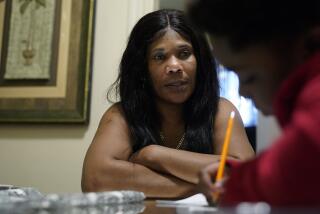13-Year-Old With AIDS Barred From School
- Share via
KOKOMO, Ind. — Officials barred a 13-year-old boy from school after learning that he had contracted AIDS during treatment for hemophilia, saying the school cannot cope with the necessary precautions and that other pupils could be at risk.
“I’m pretty upset about it,” Ryan White said Wednesday. “I’ll miss my friends, mostly.”
“Ryan’s been robbed of a lot of things,” said his mother, Jeanne. “Ever since he’s been diagnosed, we’ve had to fight for everything, and I guess it’s going to keep going on.”
Remains at Home
Since Christmas, Ryan has stayed home from Western Middle School in suburban Russiaville, where he was a seventh-grader when the AIDS, or acquired immune deficiency syndrome, was confirmed.
“We were hoping to wait until this year for new guidelines that would allow me to go back, but they just told us again I couldn’t go back,” Ryan said.
School Supt. James O. Smith said that guidelines formed recently by the state health board dictate that the school should monitor children with infectious diseases, keep rubber gloves, bleach and leakproof bags available, and hire teachers who are familiar with the virus.
“That sets up a situation we are not prepared to cope with in a school setting,” Smith said. “That’s a hospital situation.”
Situations Called Similar
Jeanne White disagrees, saying that dealing with AIDS is not that different from dealing with Ryan’s hemophilia.
“It’s not that extra amount of trouble they seem to be thinking it is,” she said. “There are a lot of people going around with the AIDS virus. You don’t see everyone else being treated like this.”
“With all the things we do and don’t know about AIDS, I just decided not to do it,” Smith said. “There are a lot of unknowns and uncertainties and then you have the inherent fear that would generate among classmates.
“We are obligated to provide an education for the child, but we are also in the habit of keeping kids out who have communicable diseases.”
No Guidelines for Young
Officials of the federal Centers for Disease Control in Atlanta said Wednesday that there is no scientific evidence that AIDS can be transmitted by casual contact. And there are no guidelines for dealing with young victims of AIDS, CDC spokeswoman Betty Hooper said.
“It’s an emerging problem,” she said. “We know of 148 cases of pediatric AIDS.”
AIDS breaks down the body’s immune system. It is most likely to strike male homosexuals, abusers of injectable drugs and hemophiliacs.
More to Read
Sign up for Essential California
The most important California stories and recommendations in your inbox every morning.
You may occasionally receive promotional content from the Los Angeles Times.













